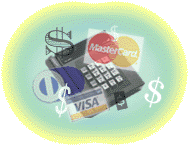 |
 |
 |
|
|||
|
Hidden Credit Card Fees
But now, some companies are doubling and tripling that fee. American Express is the latest. Beginning next month, it will be charge cardholders a two percent conversion fee. By the way, the company's travel agencies have also begun charging for services that used to be free. Today, even if you're a cardholder, you'll pay $10 for every airline ticket, rental car, or hotel you book through an Amex travel agency. But Amex looks good compared to some other credit cards, including those linked to some airline frequent flyer programs. Worst is Providian, which charges a hefty five percent conversion fee. That's $5 for every $100 you charge. Citibank charges a three per cent conversion fee. And Bank One/First USA may join the three-per cent brigade. If you carry a Diner's Club card, you're the smart guy -- so far, Diner's is holding the one percent line. Does this mean you should stop using credit and charge cards abroad? No. You're still getting the most favorable exchange rate because credit card charge you what's called the bank wholesale rate. That's the rate the bank pays when it buys or sells, oh, a million dollars in foreign currency. And it's a lot better rate than you'd pay if you stepped up to a currency kiosk and trade in a $100 for some local dinero. So what does this rise in conversion rates mean? Easy. It means card issuers will make more money. The second best way to get foreign currency abroad is by using an automated teller machine. There you also get the bank rate, but both your local bank as well as the foreign ATM you're using may assess a fee every time you use your ATM card. It could be a buck or two on each end, so don't hit an ATM every day for small amounts of money. If you think you'll need $500 worth of British pounds to make it to the end of your trip, make one big withdrawal, not five small ones. Where does this leave the choice of the '80s, old-fashioned traveler's checks? They still have their value, especially since you can't replace lost cash. But try not to pay a fee to buy them. Perhaps your bank or credit card company will issue you checks without charging a fee. After all, they get to use your money until you get around to cashing those checks. And I've know people who have kept hundreds of dollars in travelers checks in drawers for use during a future trip. The issuers of those checks salute you! You are their best profit centers -- they earn interest on your money while you have those prettily-colored checks gathering dust in your desk drawer. Keep in mind there are other good reasons to use your credit card abroad even if your conversion fee has doubled or tripled. The main benefit: If you buy something to have shipped home and it arrives damaged or isn't what you ordered, you can refuse to pay your credit card charge and it becomes the credit card company's problem. And if you're traveling on business, credit card receipts make filing an expense account or keeping track of tax deductions much easier. |
 | American Public Media Home | Search | How to Listen ©2004 American Public Media | Terms of Use | Privacy Policy |

 They're called conversion fees. That's the amount a credit or charge card
company charges you to convert your purchases in French francs, German marks,
or Japanese yen into U.S. dollars. For years, card companies have charged
one per cent. In other words, for every $100 you put on your card in a
foreign currency, they take a buck for the trouble of converting that
currency into dollars.
They're called conversion fees. That's the amount a credit or charge card
company charges you to convert your purchases in French francs, German marks,
or Japanese yen into U.S. dollars. For years, card companies have charged
one per cent. In other words, for every $100 you put on your card in a
foreign currency, they take a buck for the trouble of converting that
currency into dollars.